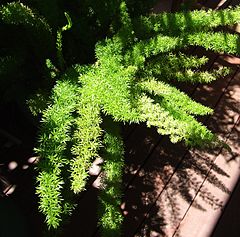Asparagus densiflorus
| Habit | herbaceous
| |
|---|---|---|
| Height: | ⇕ | 40 cm"cm" can not be assigned to a declared number type with value 40. to 70 cm"cm" can not be assigned to a declared number type with value 70. |
| Lifespan: | ⌛ | perennial |
| Exposure: | ☼ | sun, part-sun |
|---|---|---|
| Water: | ◍ | moist, moderate, dry |
| Features: | ✓ | evergreen, houseplant |
Asparagus densiflorus, Sprenger's Asparagus, is a plant native to South Africa. Often used as an ornamental plant, it is considered an invasive weed in many locations. Asparagus fern is a common name; however, it is unrelated to true ferns.[1] Some authorities also use the name A. aethiopicus as originally described by Linnaeus for this plant.[2][3]
The attribution "Sprenger's Asparagus," refers to Carl Ludwig Sprenger who made it popular in Europe as an ornamental plant. It was originally described by the German botanist Carl Sigismund Kunth, and given its current name by South African botanist John Peter Jessop.
Asparagus densiflorus is a branching perennial herb with tough green aerial stems which are sparsely covered with spines. The leaves are actually leaf-like cladodes, which are 0.8-2 cm long and 0.1-0.2 cm wide, and arise in groups of four or more from the stem. Occurring in spring, the small white or pinkish-white flowers are 0.3-0.5 cm long and arise in clusters off the stem. Flowers are followed in summer by small round berries 0.5 cm in diameter, which bear a black 3 mm diameter seed. Initially green, the berries mature and turn red in the winter. The root system is a mat of fibrous roots with bulbous tubers, from which plants may resprout.[4]
Cultivation
Asparagus densiflorus is grown as an indoor plant in cooler climates, or as an ornamental garden plant in urban gardens, rockeries or in pots. It is very hardy. Two cultivars are seen in cultivation, 'Sprengeri' is a scrambling form with sparser foliage, while 'Meyeri' has more erect stems to 70 cm (28 in) and denser foliage.[5]
Consuming the berries of Asparagus densiflorus can cause gastrointestinal symptoms such as diarrhea, vomiting and abdominal pain, and contact with the skin may cause dermatitis. The plant is toxic to domestic cats and dogs.[6]
Propagation
Pests and diseases
Varieties
Gallery
References
- ↑ Reader's Digest Illustrated Guide to Gardening in Canada. The Reader's Digest Association (Canada) Ltd.: 1979. Calkins, Carrol C., ed.
ISBN 0888500815 - ↑ "Asparagus aethiopicus". Flora of Australia Online. ABRS, ©Commonwealth of Australia (1994). Retrieved on 2009-07-29.
- ↑ "FNA Vol. 26 Page 213, 214: Asparagus aethiopicus". Flora of North America. Flora of North America. Retrieved on 2009-07-29.
- ↑ Wolff, Mark A. (1999). Winning the war of Weeds: The Essential Gardener's Guide to Weed Identification and Control. Kenthurst, NSW: Kangaroo Press. p. 43. ISBN 0-86417-993-6.
- ↑ Cite error: Invalid
<ref>tag; no text was provided for refs namedNZ - ↑ Asparagus Fern
External links
- w:Asparagus densiflorus. Some of the material on this page may be from Wikipedia, under the Creative Commons license.
- Asparagus densiflorus QR Code (Size 50, 100, 200, 500)
